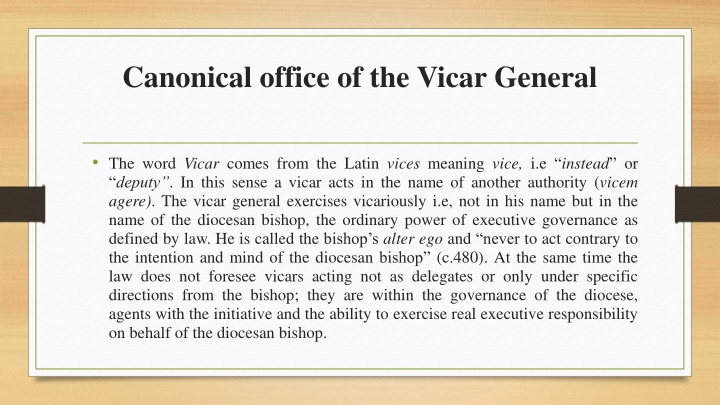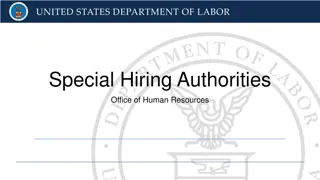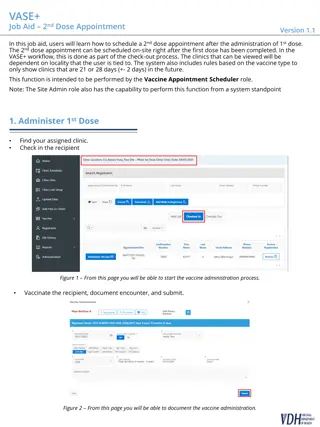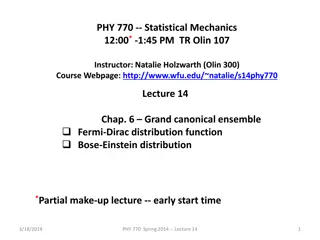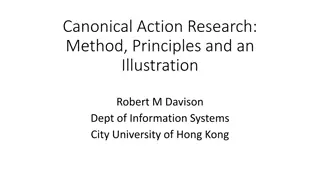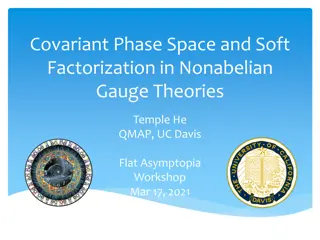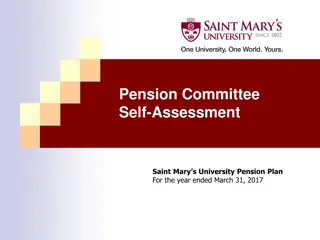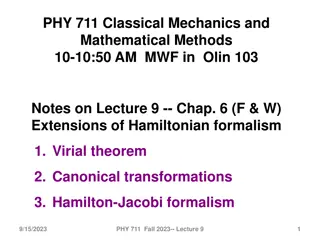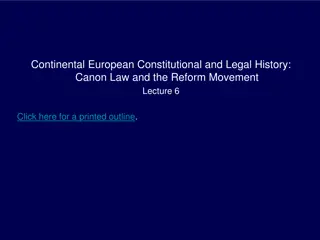Canonical Office of the Vicar General: Roles, Appointment, and Governance
The Vicar General plays a crucial role in overseeing a diocese on behalf of the bishop, exercising executive governance. This article explains the origin, functions, and appointment process of the Vicar General, highlighting the distinctions between the Vicar General and the Episcopal Vicar. The appointment of the Vicar General is now mandatory, emphasizing the importance of this office in diocesan governance.
Download Presentation

Please find below an Image/Link to download the presentation.
The content on the website is provided AS IS for your information and personal use only. It may not be sold, licensed, or shared on other websites without obtaining consent from the author.If you encounter any issues during the download, it is possible that the publisher has removed the file from their server.
You are allowed to download the files provided on this website for personal or commercial use, subject to the condition that they are used lawfully. All files are the property of their respective owners.
The content on the website is provided AS IS for your information and personal use only. It may not be sold, licensed, or shared on other websites without obtaining consent from the author.
E N D
Presentation Transcript
Canonical office of the Vicar General The word Vicar comes from the Latin vices meaning vice, i.e instead or deputy . In this sense a vicar acts in the name of another authority (vicem agere). The vicar general exercises vicariously i.e, not in his name but in the name of the diocesan bishop, the ordinary power of executive governance as defined by law. He is called the bishop s alter ego and never to act contrary to the intention and mind of the diocesan bishop (c.480). At the same time the law does not foresee vicars acting not as delegates or only under specific directions from the bishop; they are within the governance of the diocese, agents with the initiative and the ability to exercise real executive responsibility on behalf of the diocesan bishop.
Canonical office of the Vicar General The figure of the vicar general has evidence of its origin in the thirteenth century from the need of the bishop to have someone to look after the diocese in his absence. In the course of time however, in view of the need for the efficient governance of the diocese, its importance was realized even when the bishop was present in the diocese. The 1917 code had elaborate provisions on the scope. Appointment and functions of the vicar general (cc 366-371). Vatican II has stated that vicar general holds a pre-eminent position in the diocesan curia (CD, n. 27). The CIC has treated this office in canons 475- 481 along with the office of the Episcopal vicar.
Canonical office of the Vicar General As vicars of the bishop, both the vicar general and the Episcopal vicar are equal and are endowed with the same ordinary power of governance. The difference between them rests only in the extension of their jurisdiction: The competence of the vicar general extends to the entire diocese while that of the Episcopal vicar is restricted to a certain portion of the territory or section of the faithful or to a certain group of people.
Appointment of the Vicar General In the 1917 code, the appointment of a vicar general was necessary when the right government of the diocese required it (c. 366, 1). As per this norm, if the bishop was able by himself, to perform all his duties, he was not absolutely bound to nominate a vicar general. Similarly, the post-conciliar directory Ecclesiae Imago had also left this appointment to the discretion of the diocesan bishop (El. n. 201). But the present codes have made it obligatory no matter how small the diocese is (c. 475).
Appointment of the Vicar General The diocesan bishop freely appoints the vicar general without necessarily having to consult any person or body (c. 477, 1). However, pastoral exigencies would suggest that prior judicious consultation of the clergy and others would certainly facilitate a suitable choice on the part of the bishop. The diocesan administrator who generally possesses the power of a diocesan bishop (c. 427, 1), could also nominate a priest to this office, but it would be valid until the new bishop takes charge of the diocese.
Appointment of the Vicar General As a general rule, there is to be a single vicar general in the diocese, unless the size, population or other pastoral needs of the diocese suggest otherwise (c. 475, 2). If there is a coadjutor or an auxiliary bishop, he must be appointed as vicar general (c. 406) By virtue of canon 477, 2, the diocesan bishop can appoint a vicar substitute, commonly known as pro-vicar , in case of absence or legitimate impediment of the vicar general. Before taking office the vicar general has to make the profession of faith and oath of fidelity in the presence of the bishop (c. 833, 5).
Qualifications for the office of Vicar General Can 478 stipulate the qualities for those who are to be appointed vicars general: The vicar must be a priest. This requirement is for validity in view of can 150. Moreover, the figure of the vicar general theologically corresponds to the diocesan bishop as his alter ego in his pastoral and executive functions.
Qualifications for the office of Vicar General Can. 367, -2 of the 1917 code prescribed that the vicar general should be of the secular clergy, unless the diocese had been entrusted to a religious community in which case the vicar general could be chosen from among the priests of the same religious community. This restriction has been abrogated in the present codes. Hence the vicar general can also be a priest from another diocese or particular church sui iuris or member of a religious or secular institute or society of apostolic life. However, the CCEO has shown a preference for a priest from the clergy incardinated to the diocese (c. 247, 2)
Qualifications for the office of Vicar General Should be at least 30 years of age. The 2004 Directory for Bishops has preferred a higher age. forty years old or more (AS, n. 178: Should have a licentiate or a doctorate in canon law or in theology, or be at least truly expert in these discipline (c. 478, 1). The purpose of this provision is to make sure that the person assuming the office is truly competent from the point of view of welcome formation both pastoral and academic. The academic expertise should be particularly in canon law and theology. The expression or at least truly expert in these discipline is neither to be interpreted merely as an escape clause nor as an open ended requirement that would include knowledge in other sciences, such as sociology, health-care education etc.
Qualifications for the office of Vicar General Should be with sound doctrine, integrity, prudence and experience in handling matters (c. 478, 1). The 2004 Directory for Bishops has further elaborated on this requirement by stating that the vicar general is esteemed by the presbyterium and in public opinion and possesses the appropriate pastoral and administrative experience, capable of establishing a good human rapport with others and competent in dealing with diocesan affairs (AS, n. 178). Not to be related to the bishop up to the fourth degree of consanguinity (c. 478, 2). This prohibition is intended to safeguard the bishop s own freedom in making decision as well as to maintain objectivity and integrity in assessing and deciding on matters which concern the good of his diocese;
Qualifications for the office of Vicar General The office of vicar general cannot be coupled with that of Canon Penitentiary who has, according to can. 508, 1, the ordinary faculty of absolving in the internal forum undeclared latae sententiae censures not reserved to theApostolic see (c. 152);
Qualifications for the office of Vicar General Although ecclesiastical offices like parish priest or judicial vicar are not intrinsically incompatible with the office of the vicar general, combination is not desirable because the responsibilities of the one office may seriously jeopardize the fulfillment of the responsibilities of the other. One man, one job, should be a general rule also in the ecclesiastical governance.
Competence of the Vicar General The vicar general is listed among those referred to as ordinaries of the particular Church (c. 134, 1). Ordinary power of governance is that which, by virtue of the law itself, is attached to a given office (c. 131, 1). It may be proper or vicarious (c. 131, 2). The power of a diocesan bishop is ordinary and proper (c. 381, 1), while that of his vicar is ordinary but vicarious, i.e his power belongs to the office itself but is exercised in the name of the diocesan bishop.
Competence of the Vicar General Since the vicar general and the Episcopal vicars have ordinary executive power in a determinate territory, they are also called local ordinaries (c. 134, 2). This means whenever in the code or elsewhere certain administrative acts are said to belong to the ordinary or to the local ordinary, both the diocesan bishop as well as his vicars general and Episcopal have the capacity to issue them. Instead, whenever the law makes express mention of the diocesan bishop, it is understood to refer to him and to him alone and not to his vicars, unless they have received a special mandate (cc. 134, 3; 479, 1)
Executive Function of the Vicar General The bishop exercises legislative power himself and judicial power either personally or through the judicial vicar and judges (c. 391, 2). The vicar general does not have either legislative or judicial powers. He can, however issue general executive decrees that determine ways in which laws are to be applied and their observance promoted (c. 31). He can also issue general instructions to clarify prescripts of law and elaborate on and determine the methods to be observed in fulfilling them (c. 34, 1).
Executive Function of the Vicar General The vicar general exercises executive power ordinarily by placing singular administrative acts except those which the bishop has reserved to himself or which ex iure require a special mandate of the bishop (c. 479). As regards the acts the bishop reserves to himself, he must take care to ensure that these are not so many as to render useless the function of the vicar general or the episcopate vicar, who are appointed precisely to offer assistance to the diocesan bishop with the scope of promoting and supporting the good of the particular church. Any reservation should be an exception and it would not be advantage to resort to it arbitrarily on a regular basis. A reservation should be interpreted strictly since it is a restriction on the exercise of the executive power by the vicar general. That being the spirit of the law, we could even wish that the bishop habitually delegates to his vicars even those acts that are reserved to him ex iure.
Executive Function of the Vicar General According to local tradition and need of each diocese the vicar general is assigned with several responsibilities. The following are the principal administrative acts of governance provided in the CIC and other magisterial documents, which the vicar general as local ordinary can normally perform, unless the bishop has reserved any of them to himself:
Ministry of Teaching To take care that catechists fulfill their function properly (c. 780) To supervise teachers of religion in schools (c. 804) To appoint / discipline/ remove teachers of religion (c. 805). To supervise directors of catholic schools (c. 806, 2). To give permission or approval to publish books (c. 824, 1). To attest that reprints and translations of liturgical books conform to the approved edition (c. 826, 2). To permit publication of prayers books (c.826, 3). To approve publishing of Catechisms and books on Catechetical instructions and their translations (c. 827, 1).
Ministry of Sanctifying To permit or order a baptismal font in a non-parochial church or oratory (c. 858 2). To give permissions for baptism in a private house for a grave cause (c. 860, 1). To designate a person to perform baptism when the ordinary minister is absent or impeded. To allow priests to binate on week days or trinate Sundays and holidays of obligation (c. 905, 2). To approve extraordinary ministers of the Holy Communion on presentation by the parish priest. To delegate to individual priests the faculty to designate extraordinary ministers of the Holy Communion in case of necessity
Ministry of Sanctifying To permit reservation of the Eucharist in non-parochial churches, oratories and chapels (c. 934, 1, 2). To designate a non-cleric to expose the Blessed Sacrament (c. 943) To inspect records of fulfillment of Mass obligations kept in the churches of the secular clergy (c. 957). To grant or revoke faculty to hear confession (c. 969, 2 and 974). To give consent to a bishop cardinal to confer the sacrament of orders (diaconate and presbyterate) outside his own jurisdiction To permit the celebration of marriage in certain irregular situations enumerated in can. 1071
Ministry of Sanctifying For a grave cause to prohibit a marriage for a time (c. 1077, 1). To dispense from all matrimonial impediments of ecclesiastical law not reserved to theApostolic See (c. 1078, 1). To sign a mandate for a proxy at marriage (c. 1105, 2). To give individual or general faculty to priests and deacons assist at marriage (c. 1111, 1). To permit a marriage to be celebrated in a non-parochial church or oratory (c. 1118, 1). To grant permission for a mixed marriage (c. 1125).
Ministry of Sanctifying To dispense from canonical form in mixed marriages (c. 1127, 2). To permit a marriage to be celebrated secretly (cc. 1130, 1131, 2; 1132). To dispense from interpellation in the Pauline privileges marriages (1144, 2). To make a judgment on the denial of ecclesiastical funeral (c. 1184, 2). To give instructions with regard to taking photographs and videos without disturbing liturgical celebrations, especially at the celebration of Holy Mass. To see that there is an adequate supply of liturgical vestments in all the churches and oratories (RS, n. 126).
Parish Administration (vicar for the clergy) To place a parish priest in possession of his office (cc. 527, 2-3). To permit the parish priest to reside in a place near the church other than the rectory (c. 533, 1). To be informed when the parish priest will be absent for more than a week (c. 533, 2). To permit the parochial vicar to reside outside the parish (c. 550, 1). To promote a common life in the presbytery between the parish priest and the parochial vicars (c. 550, 2) To order the taking up of special collections for specific initiatives in churches and oratories (c. 1266).
Associations and Institutes of Consecrated Life (Episcopal Vicar for religious ) To be vigilant over diocesan associations and other associations to the extent that they work in the diocese (c. 305, 2) To direct the apostolate of the associations united with the institutes of consecrated life, e. g the third orders (c. 311) To confirm the choice of the spiritual advisor to a private association (c. 324, 2). To watch over the administration and distribution of goods destined for pious causes by a private association (c. 325, 2). To appoint or remove a chaplain (cc. 565 and 567, and 1). To approve ordinary confessors for religious institutes (c. 630, 3).
Associations and Institutes of Consecrated Life (Episcopal Vicar for religious ) To receive the annual financial accounts from autonomous monasteries (c. 637). To be informed about the financial reports of a religious house of diocesan right (c. 637). To give written consent for validity of alienation for the autonomous monasteries and institutes of diocesan right (c. 638, 3). To give consent for an exclaustrated religious cleric to reside in his jurisdiction (c. 686, 1) To permit private persons, physical or juridical, to collect alms or donations (c. 1265, 1). To give consent for the expiatory penalty of an order to reside in his territory (c. 1337, 2).
Other Important Function as Ordinary To grant and execute rescripts (cc. 65 and 479, 3). To dispense from diocesan laws and those issued by a plenary or provincial council or conference of bishops (c. 88) To participate in the diocesan synod and to provide at its individual sessions (cc. 462, 2 and 463, 1, 2) To participate in the particular councils with consultative vote (c. 443, 3, 1). To make pastoral visits if the bishop is legitimately impeded (c. 396, 1). To take up the interim governance of the diocese in accordance with paragraph one can. 413 when the Episcopal see is impeded.
To act in penal matters such as the following: I. To caution /warn a person against committing a delict (c. 1339, 1). II.To rebuke a person whose behavior causes scandal or grave disturbance of order (c. 1339, 2). III.To conduct preliminary investigation and to determine penal trial (cc 1717 -1722). IV.To remit an imposed or declared penalty (cc 1355, 1, 1356, 1). V.To make provision for a dismissed cleric (c. 1350, 2)
Term and Cessation of the Office of Vicar General In the case of appointment of a presbyter as vicar general, the CIC has stipulated a term of office. It is presumed to be for an indefinite period of time. Nevertheless, the bishop is not prohibited to fix a term. If an auxiliary or coadjutor bishop is appointed vicar general, the term must be indefinite in virtue of can, 406. In conformity to can. 481, the office of vicar general ceases by any one of the following: Sede vacante: If the vicar general is a priest, he immediately loses his office, If he is a bishop and if he is not appointed as the diocesan administrator, he will retain not the office of vicar general but only those powers and faculties which he possessed as vicar general (cc 409, 2 and 418, 2). In the case a transfer of the diocesan bishop to another office, the vicar general losses his office on the certain communication of the transfer although the diocese becomes vacant only on the bishop s taking possession of his new office (c. 418, 1). On the bishop s notification of the expiry of mandate, if appointed for a fixed term;
Term and Cessation of the Office of Vicar General Resignation submitted according to the norms of canons 187-188 and accepted by the bishop. Removal by the bishop for a grave and just cause (c. 193). Removal from office is an administrative act and the provision of canons 50 and 51 must be observed. The reasons that prompted the removal should thoroughly documented and notarized. The vicar general should be provided with the opportunity for self defense. Should he feel that he is unjustly removed or that the removal has harmed his good name, he can lodge hierarchical recourse according to the norms of canons 1732-1739. If the vicar general is an auxiliary or coadjutor bishop, removal from office is reserved to theApostolic See. Transfer to another office in accordance with the prescriptions of can. 190. The vicar general can also be suspended from office according to law. Moreover, paragraph two can. 481 states: When the function of the diocesan bishop is suspended, the power of a vicar general and an Episcopal vicar is suspended also unless they are bishops.
